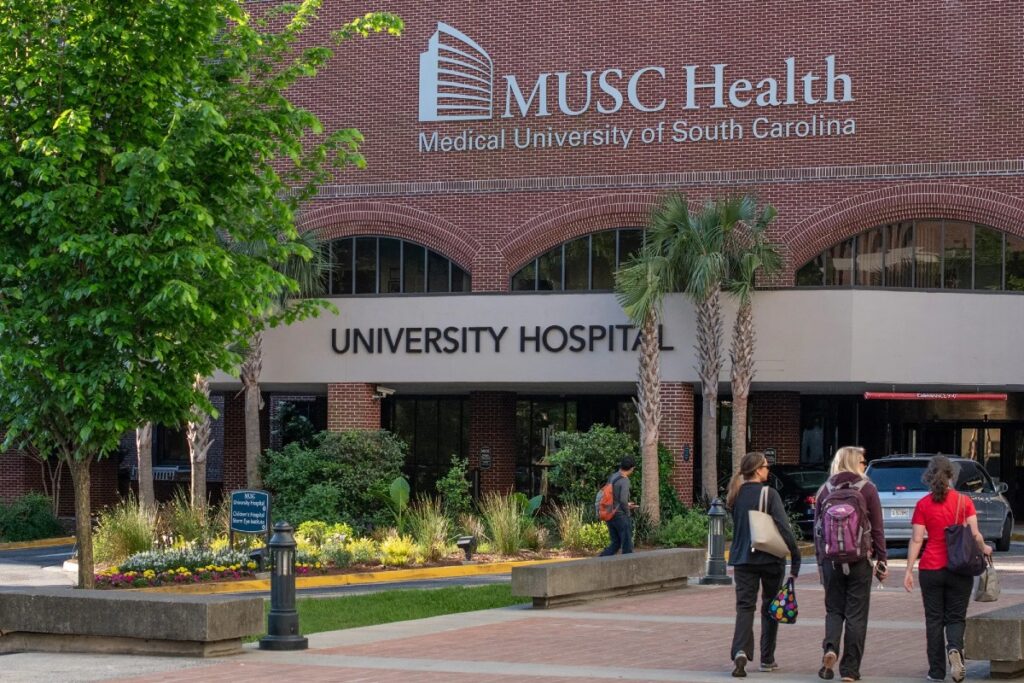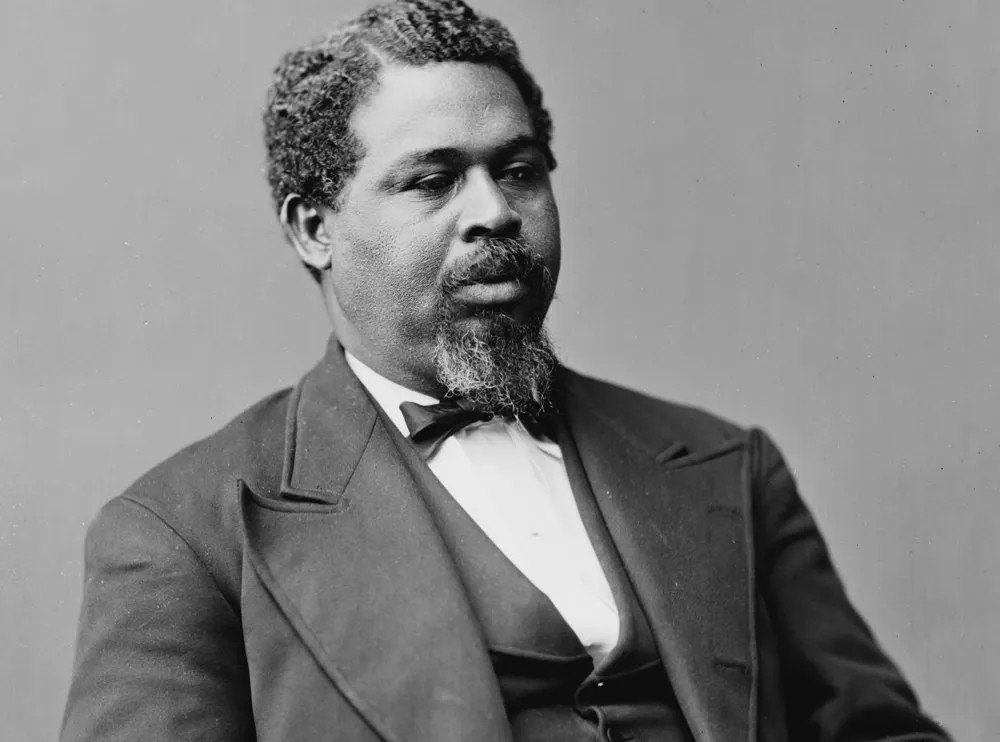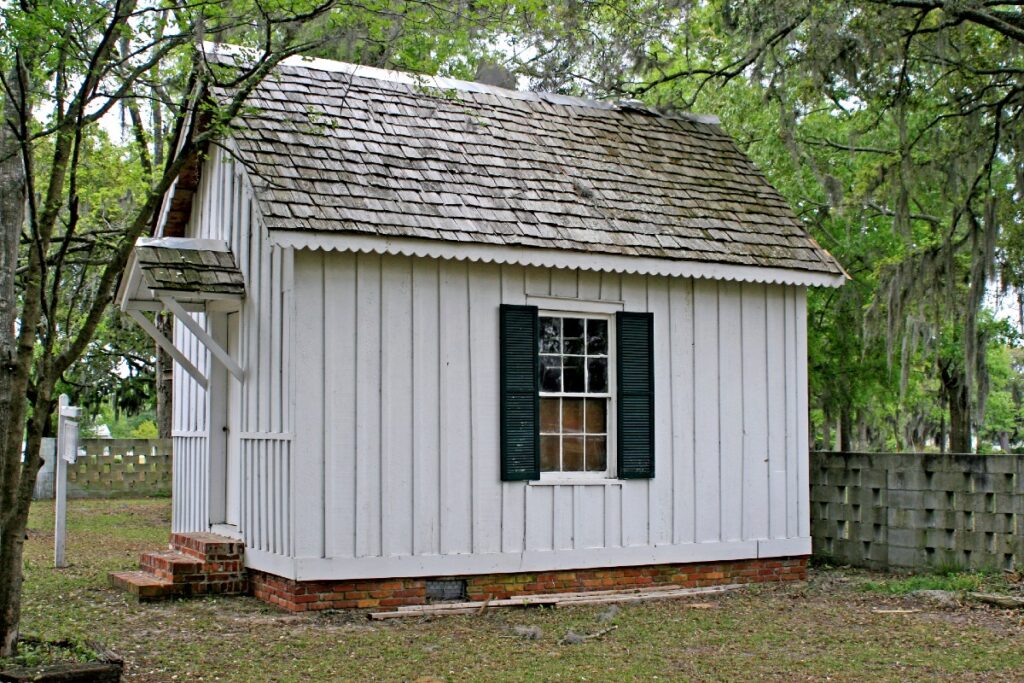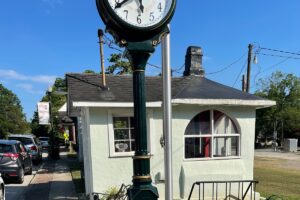STATEHOUSE REPORT | ISSUE 23.28 | July 12, 2024
BIG STORY: What S.C. can learn about fixing health care from N.C.
MORE NEWS: New law leads MUSC to end gender transition procedures
LOWCOUNTRY, Ariail: Stop polluting!
COMMENTARY, Brack: Smalls’ statue is welcome accomplishment
SPOTLIGHT: AT&T
MYSTERY PHOTO: Another tiny building
FEEDBACK: Send us your thoughts
What S.C. can learn about health care from N.C.

By Jack O’Toole, Capitol Bureau | A legislative study committee tasked with examining virtually every aspect of South Carolina’s faltering health care market will not move forward in 2024 after a sweep of Gov. Henry McMaster’s veto pen removed it from the new state budget last week.
McMaster raised two objections: the study’s six-month time frame, which he said was too short, and the inclusion of Medicaid expansion as one of the 30 market reforms to be examined.
“I remain unconvinced that the expansion of Medicaid benefits — which this legislative study committee is tasked with considering — is necessary, nor do I believe it is fiscally responsible,” McMaster said in his veto message.

But supporters of the study say a close look at what’s happening just over the border in North Carolina might ease S.C. leaders’ concerns — an idea N.C. Gov. Roy Cooper seemed to echo in recent comments to Statehouse Report.
Cooper, a moderate second-term Democrat whose state expanded Medicaid last year with supermajority Republican support in the N.C. legislature, says the Tar Heel State’s expansion has been so successful that other states have been reaching out to learn more.
“Already leaders in states that haven’t passed it have requested information and testimony from North Carolina leaders,” Cooper said in a statement, “and we are glad to share all of it with our South Carolina neighbors.”
What expansion would do
Originally offered to states as part of the Affordable Care Act (ACA), or Obamacare as it’s widely known, Medicaid expansion raises the income limit for people who get health care through the program from 67% of the federal poverty level to 138% — about $20,000 a year in today’s dollars. Under ACA rules, the federal government pays 100% of the cost of expansion in the first three years and 90% thereafter.
South Carolina is one of only 10 states that has not opted to expand. If South Carolina were to participate, about 300,000 people living at the low end of South Carolina’s wage spectrum would have a chance to get better health care.
Beaufort Republican Sen. Tom Davis, who sponsored the budget amendment creating the study committee, says he shares the governor’s “concerns and reservations about Medicaid expansion” and respects his decision.
But he also warns that continued inaction in the face of significant problems in the state’s health care market, including high costs for patients, struggling rural hospitals and a growing shortage of doctors and providers, could eventually lead to far more drastic changes.
“(The committee) was an attempt to take a comprehensive look at the supply and demand sides of healthcare markets and how they could be improved,” Davis told Statehouse Report. “Because doing nothing will keep us lurching toward the most unacceptable outcome of all — a single-payer system.”
Moreover, he notes, many states with conservative credentials every bit as strong as South Carolina’s have found ways to benefit from expansion.
“The intent would be to better understand the flexibility waivers that have convinced many conservative states to expand Medicaid,” Davis said. “Arizona, Arkansas, Indiana, Iowa, Montana and Utah have all secured (federal Social Security Act) Section 1115 waivers to operate their Medicaid expansion programs in ways not otherwise allowed under federal law.”
Others with concerns about McMaster’s veto again point to a state closer to home — North Carolina.

“They’ve done an incredible job,” said Sue Berkowitz, policy director at the Appleseed Legal Justice Center and a member of the leadership committee of Cover S.C., which advocates for health care reform in the Palmetto State. “People with concerns should look at the success they’ve had in North Carolina.”
The North Carolina experience
North Carolina’s Medicaid expansion was signed into law in March of last year with strong bipartisan support, winning the votes of more than two-thirds of Republicans in the state legislature.
Since the law went into effect in December, about half a million North Carolinians have signed up for coverage.
N.C. Senate President Pro Tem Phil Berger, long a fierce Republican opponent of Medicaid expansion, explained his change of heart in a 2023 op-ed.
“By expanding Medicaid now — on our own terms — we increase access to health care in a thoughtful, conservative way,” Berger wrote. “We pass a plan that is good for North Carolina, and we take advantage of holding out for the past decade and secure a significant stimulus that avoids the financial hit the state would have taken years ago.”
Cooper told Statehouse Report that his state’s bipartisan legislative supermajority vote reflected the reality on the ground across his state.
“We built a non-traditional coalition of advocates,” Cooper said, “including Republican county commissioners who wanted to keep rural hospitals open, law enforcement leaders who knew their officers and jails were spending too much time with people who needed health care and not handcuffs, business leaders who knew private insurance premiums are lower when medical providers have less indigent care and more.”
And already, he says, the results have been “transformative” for N.C.
“Medicaid expansion is changing lives across North Carolina. Nearly 500,000 people have enrolled in quality, affordable health care in the seven months since Medicaid expansion went live,” Cooper said. “That is transformative for hard-working families, our economy, our rural health care system and the fight against the opioid crisis.”
The coalition for reform in S.C.
Here in South Carolina, advocates are working to create a similarly broad-based coalition for health care reform through Cover S.C., a grassroots network of more than 40 organizations including the Appleseed Center, the S.C. Small Business Chamber of Commerce (SBCC) and AARP South Carolina.
SBCC President Frank Knapp says reform is critical for Palmetto State small businesses, which need healthy workers but often struggle to provide coverage for their employees due to high premium costs.

“We have well over 300,000 South Carolinians caught in the coverage gap where they make too much to qualify for traditional Medicaid but too little to qualify for premium assistance under the ACA,” Knapp said. “It’s unfair to them and it’s unfair to most South Carolinians, who have to pay for the uncompensated care.”
Uncompensated care occurs when people who are unable to pay for medical care receive needed treatments, usually in emergency rooms. Hospitals then pass those costs along to everyone else in the form of inflated prices, which in turn leads to higher insurance premiums.
Charmaine Fuller Cooper, state director of AARP SC, said her organization sees many older South Carolinians who are trapped in the coverage gap Knapp describes, making both too much money and too little.
“People between 50 and 65 are often not working as many hours and don’t have the full-time benefits they would like to have,” she said. “And because of that, they can’t afford the healthcare they need.”
But like other members of Cover S.C. — and like Cooper in N.C. — Fuller Cooper stresses the importance of listening to everyone’s concerns and working together to build the broadest possible coalition for reform.
“We are looking forward to having further conversations with the governor to find out more about what his concerns are and to see if we can address those concerns moving forward,” she said.
- Have a comment? Send to: feedback@statehousereport.com.
New law leads MUSC to end gender transition procedures

(UPDATED, 2:30 p.m., 7/12/24) The Medical University of South Carolina (MUSC) will stop providing gender transition surgeries and hormones for all patients, including adults, due to a new law signed in May.
According to the law, “public funds may not be used directly or indirectly for gender transition procedures.”
MUSC Chief Executive Officer Dr. Patrick J. Cawley confirmed the news in a Friday statement to Statehouse Report. “MUSC Health funds are public funds,” he said. “We are prohibited from providing gender transition services to all patients.”
At the time the proposed law was being debated, supporters touted it as a ban on gender-affirming care for minors, not adults.
“I think this is a good idea to keep our young people safe and healthy,” Gov. Henry McMaster told reporters in January. “If they want to make those decisions later when they’re adults, then that’s a different story, but we must protect our young people from irreversible decisions.”
Chase Glenn, executive director of the Alliance for Full Acceptance (AFFA), today told Statehouse Report that MUSC’s broad interpretation of the law is “unfortunate” but not completely unexpected.
“We’re extremely disappointed MUSC has landed on this interpretation of the law,” Glenn said. “But by putting this vague language in the bill, legislators have made providers fearful that they might be committing a felony crime by providing this care.”
Glenn, a transgender man who relies on MUSC for medical care, said he’s just one of about 300 patients who will be impacted by MUSC’s decision. He recommended that anyone in need of a new provider visit the Campaign for Southern Equality website for assistance.
“AFFA has partnered with the Campaign for Southern Equality to provide this service,” Glenn said. “They have a special fund and a patient navigator to help people find a new provider.”
In other recent news:
![]() New S.C. law expands access to childcare job opportunities. South Carolina leaders have pledged to make childcare more affordable and widely available for families with a new law.
New S.C. law expands access to childcare job opportunities. South Carolina leaders have pledged to make childcare more affordable and widely available for families with a new law.
State budget provision bans cell phones in classrooms. The state budget also mandates that school districts need to implement an anti-phone policy in order to receive state funding.
Group organizing convention to alter U.S. Constitution failed to get S.C. funding. Phoenix Correspondence Commission, a quasi-government entity based outside of Sacramento, Calif. seeking to amend the U.S. Constitution, was denied $50,000 from the South Carolina state budget by Gov. Henry McMaster.
State senator secures $300K in state budget for domestic violence shelter. A Lowcountry domestic violence shelter is getting financial help from this year’s state budget thanks to Sen. Deon Tedder, D-Charleston.
Retired teachers could help S.C. educator shortage. Schools across South Carolina are dealing with challenges in finding qualified, certified teachers, increasing the state’s educator shortage to unprecedented levels. Now, districts are looking toward retired teachers to help address the ongoing issue.
S.C. education department spends $2K on new logo. The state Department of Education is touting a new logo after moving to a new building last month.
Advocates saying S.C. law protecting pregnant workers is working. The state has had fewer complaints than expected, indicating most businesses are offering pregnant workers accommodations.
Stop polluting!

Nationally award-winning cartoonist Robert Ariail always has an interesting take. This week, he takes on ocean pollution. What do you think – love the cartoon? Hate it? Send your thoughts to feedback@statehousereport.com.
Smalls’ statue is welcome accomplishment

By Andy Brack | Perhaps the most unheralded achievement of the 2024 legislative session was the bipartisan effort that will place the first individual statue honoring a great Black South Carolinian on the Statehouse grounds.
 S.C. Gov. Henry McMaster on May 20 signed a bill into law to establish a monument to Robert Smalls, the Civil War hero and Reconstruction leader born enslaved in 1839 in Beaufort.
S.C. Gov. Henry McMaster on May 20 signed a bill into law to establish a monument to Robert Smalls, the Civil War hero and Reconstruction leader born enslaved in 1839 in Beaufort.
As a 23-year-old pilot in Charleston, Smalls commandeered a Confederate ship called the Planter, sailed 15 family members through a blockade and turned over the ship to Union forces, thus escaping slavery. After it was overhauled, he was made its captain as it was used in the rest of the war.
“He served the Union Army as a civilian boat pilot with distinction in numerous engagements, acted as a spokesperson for African Americans, and was made the first Black captain of an Army vessel for his valor,” according to text in the new law.
Smalls later served in the S.C. House and S.C. Senate before being elected for five terms as a member of Congress between 1875 to 1887. He endured “violent elections to achieve internal improvements for coastal South Carolina and to fight for his Black constituents in the face of growing disenfranchisement.”
Michael B. Moore, a direct descendant of Smalls, is a current Charleston-area Democratic candidate trying to win a seat in Congress.
“I am deeply honored and proud to see my great-great-grandfather, Robert Smalls, celebrated with a statue on the Statehouse grounds,” Moore told Statehouse Report. “In this hyperpartisan world, the fact that this was an overwhelmingly bipartisan effort is both exceedingly rare and meaningful. It is a testament to his enduring legacy and the power of unity.”
Freshman Republican Rep. Brandon Cox of Berkeley County, who introduced the bill honoring Smalls, earlier this year said its unanimous support in the House in March “says a lot about the state of South Carolina and where we are today. It shows that we are in the 21st century and that is a positive thing for our state.”
South Carolina made history in 2001 as the first of 50 states to have a monument dedicated to Black history on the grounds of its state capitol. But until now, all of the Statehouse’s stand-alone monuments, markers and statues have memorialized White leaders.
The new law empowers a Robert Smalls Monument Commission to determine the design and location of a monument to the Beaufort native and for it to be erected “as soon as is reasonably possible after the design plan has been approved by the General Assembly by a concurrent resolution.” The commission, made up of five members appointed each by the House and Senate plus the director of the state Department of Administration or a designee, has a deadline to report a proposed design and location to legislators by Jan. 15, 2025.
According to a 90-page report from 2015 by the State Historic Preservation Office of the S.C. Department of Archives and History, there are scores of historic places in the Palmetto State that have important associations with African American history. These include schools, churches, cemeteries, homes, libraries, battle sites, markets, orphanages and more.
But there appeared to be no statues in the report. In recent years, however, Charleston unveiled a monument to freedman Denmark Vesey in Hampton Park. Last month saw the unveiling in Beaufort of a monument to Harriet Tubman, the conductor on the Underground Railroad who escaped slavery, only to return several times to liberate 70 people before and during the Civil War.
A statue recognizing Smalls is a win for all South Carolinians. Let’s hope state legislators can come together more often next year in a bipartisan manner to create policy wins that will improve education, provide access to health care to more people, clean up pollution and generate greener power.
Andy Brack is editor and publisher of the Charleston City Paper and Statehouse Report. Have a comment? Send to: feedback@statehousereport.com.
- Have a comment? Send to: feedback@statehousereport.com.
AT&T
 The public spiritedness of our underwriters allows us to bring Statehouse Report to you at no cost. Today’s featured underwriter is AT&T Inc.
The public spiritedness of our underwriters allows us to bring Statehouse Report to you at no cost. Today’s featured underwriter is AT&T Inc.
AT&T Inc. (NYSE:T) helps millions around the globe connect with leading entertainment, mobile, high speed Internet and voice services. We’re the world’s largest provider of pay TV. We have TV customers in the U.S. and 11 Latin American countries. We offer the best global coverage of any U.S. wireless provider*. And we help businesses worldwide serve their customers better with our mobility and highly secure cloud solutions.
- Additional information about AT&T products and services is available at http://about.att.com.
- Follow our news on Twitter at @ATT, on Facebook at http://www.facebook.com/att and YouTube at http://www.youtube.com/att.
* Global coverage claim based on offering discounted voice and data roaming; LTE roaming; voice roaming; and world-capable smartphone and tablets in more countries than any other U.S. based carrier. International service required. Coverage not available in all areas. Coverage may vary per country and be limited/restricted in some countries.
Another tiny building

After last week’s photo of a tiny building, a reader sent in another that might be new to you. What and where is it? Send your name, hometown and guess to: feedback@statehousereport.com.
Last week’s mystery, “Cute little building,” is known as the “world’s smallest police station,” a 10-foot-by-12-foot structure in Ridgeway in Fairfield County. Thanks to Barry Wingard of Florence for the photo.
 Reader George Graf of Palmyra, Va., shares that before it was a police station, the area was the town’s well: “The area behind the police station is known as the cotton yard. It’s called this because it was used as a staging area for cotton farmers bringing their cotton into town to be loaded on the train for shipment. Before farmers would leave town, they would pull their wagons up to the well to water their mules and oxen.
Reader George Graf of Palmyra, Va., shares that before it was a police station, the area was the town’s well: “The area behind the police station is known as the cotton yard. It’s called this because it was used as a staging area for cotton farmers bringing their cotton into town to be loaded on the train for shipment. Before farmers would leave town, they would pull their wagons up to the well to water their mules and oxen.
“In 1940, as part of the old WPA project, the well was covered up and the ‘World’s Smallest Station’ was born and served several officers until 1990 when the current police station opened up. The ‘new’ station was formerly the Town’s garage and housed a tractor and equipment for Ridgeway’s Water and Sewer Department.”
Hats off to the almost two dozen readers who identified the building: Bill Segars and Michael Webb, both of Hartsville; Steve Willis of Lancaster; Allan Peel of San Antonio, Texas; Jay Altman and Elizabeth Jones, both of Columbia; Pat Keadle of Perry; Will Bradley of Las Vegas, Nevada; Will Williams of Aiken; David Lupo of Mount Pleasant; Tom Stickler of Pawleys Island; Hope Williams of Varnville; Truett Jones of Summerton; Robert Kornyak of Conway; John Catoe of Great Falls; Wendy Ali of Sumter; and Heather Kitchens of Lexington.
- Send us a mystery picture. If you have a photo that you believe will stump readers, send it along (but make sure to tell us what it is because it may stump us too!) Send to: feedback@statehousereport.com and mark it as a photo submission. Thanks.
Send us your thoughts
We encourage you to send in your thoughts about policy and politics impacting South Carolina. We’ve gotten some letters in the last few weeks – some positive, others nasty. We print non-defamatory comments, but unless you provide your contact information – name and hometown, plus a phone number used only by us for verification – we can’t publish your thoughts.
- Have a comment? Send your letters or comments to: feedback@statehousereport.com. Make sure to provide your contact details (name, hometown and phone number for verification. Letters are limited to 150 words.
ABOUT STATEHOUSE REPORT
Statehouse Report, founded in 2001 as a weekly legislative forecast that informs readers about what is going to happen in South Carolina politics and policy, is provided to you at no charge every Friday.
- Editor and publisher: Andy Brack, 843.670.3996
- Statehouse bureau chief: Jack O’Toole
Donate today
We’re proud to offer Statehouse Report for free. For more than a dozen years, we’ve been the go-to place for insightful independent policy and political news and views in the Palmetto State. And we love it as much as you do.
But now, we can use your help. If you’ve been thinking of contributing to Statehouse Report over the years, now would be a great time to contribute as we deal with the crisis. In advance, thank you.
More
- Mailing address: Send inquiries by mail to: P.O. Box 21942, Charleston, SC 29413
- Subscriptions are free: Click to subscribe.
- We hope you’ll keep receiving the great news and information from Statehouse Report, but if you need to unsubscribe, go to the bottom of the weekly email issue and follow the instructions.
- Read our sister publication: Charleston City Paper (every Friday in print; Every day online)
- © 2024, Statehouse Report, a publication of City Paper Publishing, LLC. All rights reserved.


